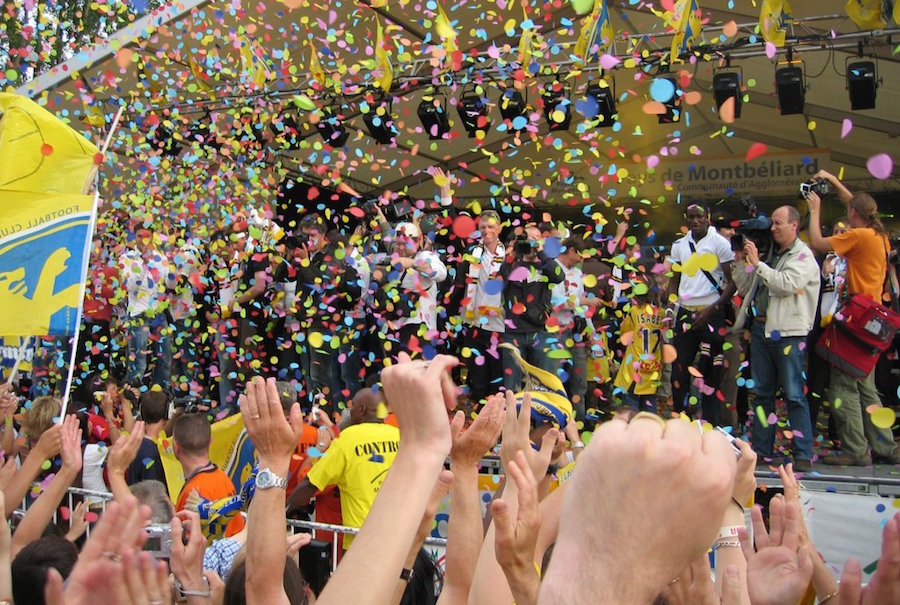Sochaux FC fans celebrating after the team won the Coupe de France in 2007. (Photo: Arnaud25 via Wikimedia Commons)
The sale of historic French football club FC Sochaux by carmaker Peugeot to a Chinese high-tech company has sparked a cultural revolution in the grey industrial bastion.
Tradition means a lot in Sochaux. Peugeot created the football club in 1928 for its workers. The team has spent a record 66 seasons in the French top league until they were relegated last year. Olympique Marseille and Paris Saint-Germain cannot match that.
The Auguste-Bonal stadium is in the shadow of the Peugeot factory that still employs 10,000 workers.
But that heritage is about to go out the window with the arrival of Tech Pro, a Hong Kong-listed electrical components manufacturer, who have said they will pay EUR7 million (HKD58.5 million) for Sochaux in a deal which could be completed in May.
Tech Pro chairman Li Wing-Sang has paid tribute to the “fabulous brand” which he said Sochaux represents.
“We don’t want big changes. We want to support what works well, to conserve Sochaux’s culture intact, at 100 percent,” he told the regional L’Est Republicain newspaper recently.
The creation of the football club by the Peugeot family created an extraordinary social network for this region and gave it an identity card,” said Marcel Bonnot, president of the Pays de Montbeliard regional council which takes in Sochaux.
“This is a real cultural and sporting shock,” he added.
Sochaux president Laurent Pernet said that selling a club with such a stable ownership was a “first in Europe”.
“The object of the management team now is to get through this transition so that the spirit and soul of the club change as little as possible and remains with its historic values.”
Pernet stressed however that the new owners have a “serious and longterm” economic plan.
Sochaux’s players have sought to stay out of the takeover spotlight. But coach Olivier Echouafni acknowledged the “little revolution” taking place around the stadium.
Meanwhile, Peugeot has decided its future interests are not in football.
“FC Sochaux, it’s not about sporting sponsoring, it’s a club which belongs to the group. Football is not among the sports which the brand wants to invest in,” said Peugeot marketing and communication director Guillaume Couzy.
Couzy remains evasive concerning the future of the Peugeot lion emblem which features on the Sochaux jersey.
The global financial crisis has seen Peugeot focused more on auto racing, though it withdrew from the Le Mans 24 hour race in 2012.
“They are very present in traditional partnerships, brands. In tennis for the general public, in golf for B2B (business to business) communication,” said Bruno Bianzina, director of Sport Market, an agency specializing in sports marketing.
Last year Peugeot celebrated the 30th anniversary of their involvement in tennis, notably the French Open Grand Slam event.
In 2011, the French Open victory by Asia’s only Grand Slam winner Li Na boosted sales of Peugeot models in China.
Ambush marketing
Now, through the recruitment of Novak Djokovic as an “ambassador”, the brand gets global attention, especially in Asia where the Serb is extremely popular.
“It’s a kind of ambush marketing. Whenever there is an international event, Peugeot is there through Djoko even if they aren’t the sponsors,” explained Lionel Maltese, professor of marketing at the Kedge Business School
For many, the withdrawal of Peugeot from Sochaux is nothing to do with tradition.
Peugeot’s ownership was “anachronistic”, according to Bianzina. “It’s paternalism which is no longer fashionable.”
“The sale of FC Sochaux is not a financial issue, the EUR7 million raised will not change the game for Peugeot.”
“It’s only bringing things into line with modern sponsorship.”
Words: AFP




